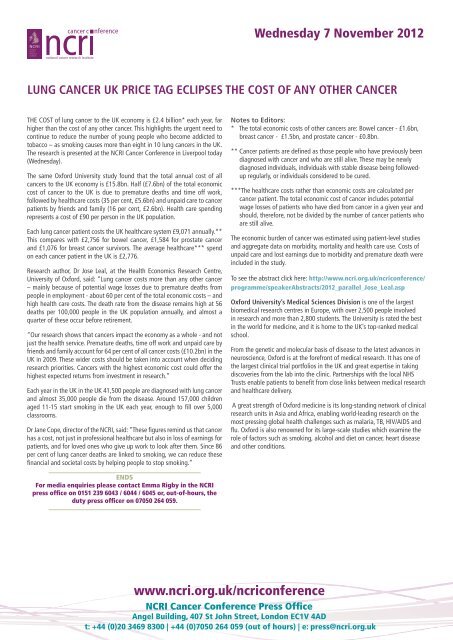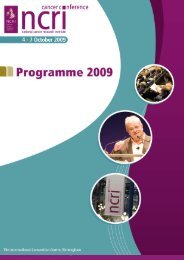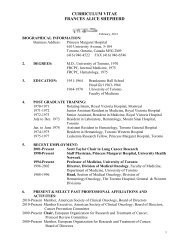lung_cancer_uk_price_tag_... - (NCRI) Cancer Conference 2013 ...
lung_cancer_uk_price_tag_... - (NCRI) Cancer Conference 2013 ...
lung_cancer_uk_price_tag_... - (NCRI) Cancer Conference 2013 ...
Create successful ePaper yourself
Turn your PDF publications into a flip-book with our unique Google optimized e-Paper software.
Wednesday 7 November 2012LUNG CANCER UK PRICE TAG ECLIPSES THE COST OF ANY OTHER CANCERTHE COST of <strong>lung</strong> <strong>cancer</strong> to the UK economy is £2.4 billion* each year, farhigher than the cost of any other <strong>cancer</strong>. This highlights the urgent need tocontinue to reduce the number of young people who become addicted totobacco – as smoking causes more than eight in 10 <strong>lung</strong> <strong>cancer</strong>s in the UK.The research is presented at the <strong>NCRI</strong> <strong>Cancer</strong> <strong>Conference</strong> in Liverpool today(Wednesday).The same Oxford University study found that the total annual cost of all<strong>cancer</strong>s to the UK economy is £15.8bn. Half (£7.6bn) of the total economiccost of <strong>cancer</strong> to the UK is due to premature deaths and time off work,followed by healthcare costs (35 per cent, £5.6bn) and unpaid care to <strong>cancer</strong>patients by friends and family (16 per cent, £2.6bn). Health care spendingrepresents a cost of £90 per person in the UK population.Each <strong>lung</strong> <strong>cancer</strong> patient costs the UK healthcare system £9,071 annually.**This compares with £2,756 for bowel <strong>cancer</strong>, £1,584 for prostate <strong>cancer</strong>and £1,076 for breast <strong>cancer</strong> survivors. The average healthcare*** spendon each <strong>cancer</strong> patient in the UK is £2,776.Research author, Dr Jose Leal, at the Health Economics Research Centre,University of Oxford, said: “Lung <strong>cancer</strong> costs more than any other <strong>cancer</strong>– mainly because of potential wage losses due to premature deaths frompeople in employment - about 60 per cent of the total economic costs – andhigh health care costs. The death rate from the disease remains high at 56deaths per 100,000 people in the UK population annually, and almost aquarter of these occur before retirement.“Our research shows that <strong>cancer</strong>s impact the economy as a whole - and notjust the health service. Premature deaths, time off work and unpaid care byfriends and family account for 64 per cent of all <strong>cancer</strong> costs (£10.2bn) in theUK in 2009. These wider costs should be taken into account when decidingresearch priorities. <strong>Cancer</strong>s with the highest economic cost could offer thehighest expected returns from investment in research.”Each year in the UK in the UK 41,500 people are diagnosed with <strong>lung</strong> <strong>cancer</strong>and almost 35,000 people die from the disease. Around 157,000 childrenaged 11-15 start smoking in the UK each year, enough to fill over 5,000classrooms.Dr Jane Cope, director of the <strong>NCRI</strong>, said: “These figures remind us that <strong>cancer</strong>has a cost, not just in professional healthcare but also in loss of earnings forpatients, and for loved ones who give up work to look after them. Since 86per cent of <strong>lung</strong> <strong>cancer</strong> deaths are linked to smoking, we can reduce thesefinancial and societal costs by helping people to stop smoking.”Notes to Editors:* The total economic costs of other <strong>cancer</strong>s are: Bowel <strong>cancer</strong> - £1.6bn,breast <strong>cancer</strong> - £1.5bn, and prostate <strong>cancer</strong> - £0.8bn.** <strong>Cancer</strong> patients are defined as those people who have previously beendiagnosed with <strong>cancer</strong> and who are still alive. These may be newlydiagnosed individuals, individuals with stable disease being followedupregularly, or individuals considered to be cured.***The healthcare costs rather than economic costs are calculated per<strong>cancer</strong> patient. The total economic cost of <strong>cancer</strong> includes potentialwage losses of patients who have died from <strong>cancer</strong> in a given year andshould, therefore, not be divided by the number of <strong>cancer</strong> patients whoare still alive.The economic burden of <strong>cancer</strong> was estimated using patient-level studiesand aggregate data on morbidity, mortality and health care use. Costs ofunpaid care and lost earnings due to morbidity and premature death wereincluded in the study.To see the abstract click here: http://www.ncri.org.<strong>uk</strong>/ncriconference/programme/speakerAbstracts/2012_parallel_Jose_Leal.aspOxford University’s Medical Sciences Division is one of the largestbiomedical research centres in Europe, with over 2,500 people involvedin research and more than 2,800 students. The University is rated the bestin the world for medicine, and it is home to the UK’s top-ranked medicalschool.From the genetic and molecular basis of disease to the latest advances inneuroscience, Oxford is at the forefront of medical research. It has one ofthe largest clinical trial portfolios in the UK and great expertise in takingdiscoveries from the lab into the clinic. Partnerships with the local NHSTrusts enable patients to benefit from close links between medical researchand healthcare delivery.A great strength of Oxford medicine is its long-standing network of clinicalresearch units in Asia and Africa, enabling world-leading research on themost pressing global health challenges such as malaria, TB, HIV/AIDS andflu. Oxford is also renowned for its large-scale studies which examine therole of factors such as smoking, alcohol and diet on <strong>cancer</strong>, heart diseaseand other conditions.ENDSFor media enquiries please contact Emma Rigby in the <strong>NCRI</strong>press office on 0151 239 6043 / 6044 / 6045 or, out-of-hours, theduty press officer on 07050 264 059.www.ncri.org.<strong>uk</strong>/ncriconference<strong>NCRI</strong> <strong>Cancer</strong> <strong>Conference</strong> Press OfficeAngel Building, 407 St John Street, London EC1V 4ADt: +44 (0)20 3469 8300 | +44 (0)7050 264 059 (out of hours) | e: press@ncri.org.<strong>uk</strong>
About the <strong>NCRI</strong> <strong>Cancer</strong> <strong>Conference</strong>The National <strong>Cancer</strong> Research Institute (<strong>NCRI</strong>) <strong>Cancer</strong><strong>Conference</strong> is the UK’s major forum for showcasing the bestBritish and international <strong>cancer</strong> research. The <strong>Conference</strong>offers unique opportunities for networking and sharingknowledge by bringing together world-leading experts fromall <strong>cancer</strong> research disciplines. The eighth annual <strong>NCRI</strong> <strong>Cancer</strong><strong>Conference</strong> is taking place from 4–7 November 2012 at the BTConvention Centre in Liverpool. For more information visitwww.ncri.org.<strong>uk</strong>/ncriconferenceAbout the <strong>NCRI</strong>The National <strong>Cancer</strong> Research Institute (<strong>NCRI</strong>) was establishedin April 2001. It is a UK-wide partnership between thegovernment, charity and industry which promotes co-operationin <strong>cancer</strong> research among the 22 member organisations for thebenefit of patients, the public and the scientific community.For more information visit www.ncri.org.<strong>uk</strong><strong>NCRI</strong> members are: the Association of the BritishPharmaceutical Industry (ABPI); Association for International<strong>Cancer</strong> Research; Biotechnology and Biological SciencesResearch Council; Breakthrough Breast <strong>Cancer</strong>; Breast <strong>Cancer</strong>Campaign; <strong>Cancer</strong> Research UK; CHILDREN with CANCER UK;Department of Health; Economic and Social Research Council;Le<strong>uk</strong>aemia & Lymphoma Research; Ludwig Institute for <strong>Cancer</strong>Research; Macmillan <strong>Cancer</strong> Support; Marie Curie <strong>Cancer</strong> Care;Medical Research Council; Northern Ireland Health and SocialCare (Research & Development Office); Prostate <strong>Cancer</strong> UK; RoyCastle Lung <strong>Cancer</strong> Foundation; Scottish Government HealthDirectorates (Chief Scientist Office); Tenovus; The WellcomeTrust; Welsh Government (National Institute for Social Care andHealth Research); and Yorkshire <strong>Cancer</strong> Research.www.ncri.org.<strong>uk</strong>/ncriconference<strong>NCRI</strong> <strong>Cancer</strong> <strong>Conference</strong> Press OfficeAngel Building, 407 St John Street, London EC1V 4ADt: +44 (0)20 3469 8300 | +44 (0)7050 264 059 (out of hours) | e: press@ncri.org.<strong>uk</strong>






